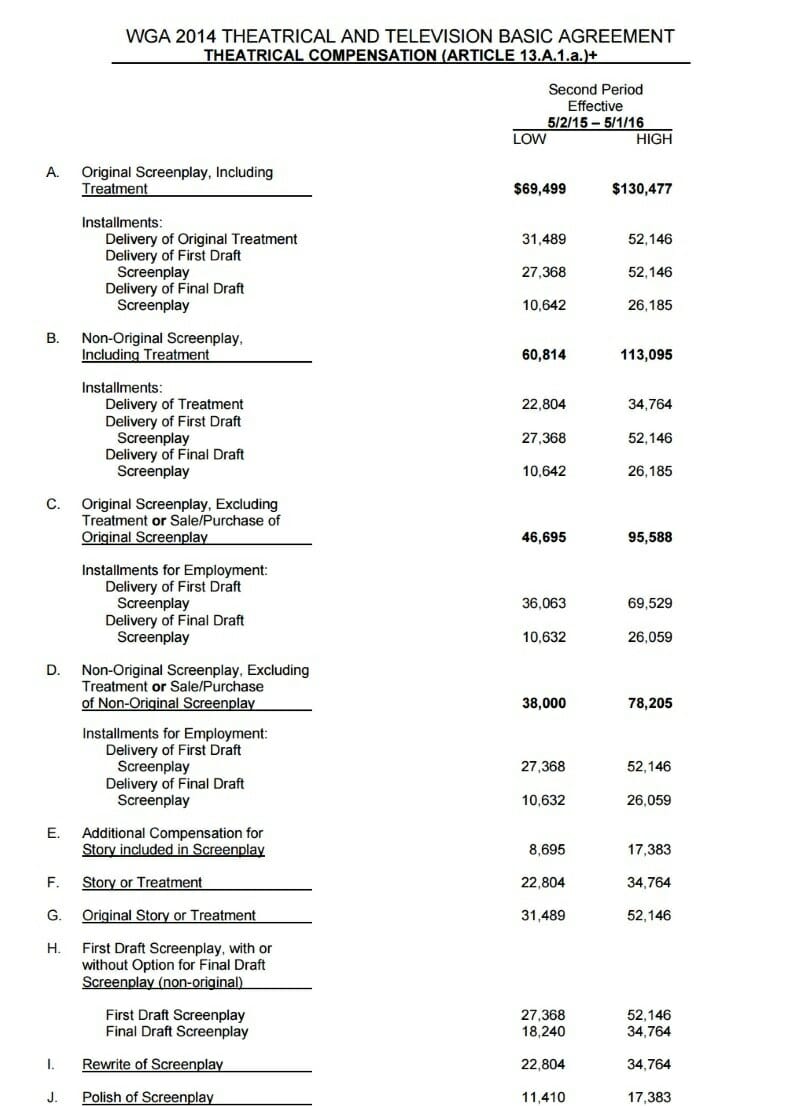By Ken Miyamoto from ScreenCraft · October 31, 2018

How long should it take write that screenplay of yours?
It’s a common — but somewhat loaded — question. When you’ve been in the industry for many years and have worked on both ends of the table (studio script reader and produced screenwriter in my case), this question always pops up from those seeking some guidance and advice.
As the one answering, you get the feeling that if you take it easy on newcomers and state that it’s a more extended period of time (six months to a year and beyond), you’re misleading them. If you tell the truth and state that it’s a shorter period of time (10-12 weeks), people will scoff or become overwhelmed.
The truth of the matter is — it’s both. But it’s all about the context.
Writing your first feature script is like going to college for that first semester. You don’t really know what you’re doing. You’re just trying to get through it and learn something along the way. You’re getting used to the schedule. You’re familiarizing yourself with the lay of the campus. You’re a fish out of water — but it’s exciting. There’s a certain thrill to being on your own. The freedom is both exhilarating and terrifying at the same time.

That first script is the initiation into a club of thousands trying to do the very same thing you’re doing — crafting a compelling cinematic story.
You haven’t mastered the format yet — far from it. You’re studying screenplays that you’ve found online or published ones at the bookstore. You’re reading the screenwriting books and Googling words of advice. You may even be taking a course or two.
When you’re writing your first screenplay, you’re writing what the industry calls a spec script — a script that is written under speculation that someone in the know may option, acquire, and produce it. In short, you’re writing for free. You’re writing for you.
And because you are learning as you go — with a few notes, articles, and books of reference in hand — it’s going to take more time. You have yet to learn the discipline of hard deadlines. You have yet to feel the pressure of powers that be waiting for your latest draft.
You’re writing for you. And chances are it’s a passion project that has captured your imagination.
So take your time. Find your process. See what type of schedule works for you. Maybe you have another career and only can find time to write after a long workday. Maybe you have a family and can’t write until everyone is either out of the house or fast asleep. Maybe you can only write for an hour a day or one day out of the week. Maybe you write on your day off for eight hours at the local coffee shop or bookstore.
That first screenplay is going to take awhile. Your mind is going to try to avoid the mental work at all costs when you first start out. You’ll mistake that for writer’s block, but it really is a lack of focus, preparation, or drive.
Read ScreenCraft’s 7 Reasons Why “Writer’s Block” is BS!
You’ll also be battling insecurities. You may be overwhelmed with all of the screenwriting books you’ve read — many of which offer contradictory advice or single-minded false formulas for success.
There is no single answer on how to get through this. It’s a rite of passage.
So that first script will surely take you anywhere from six months to a year or more. But that isn’t just the average screenwriting process. It’s your first taste of that art, craft, and business.
Once you’ve finally finished that first screenplay, you’re no longer that first-year fresh face on campus — but you’re far from that seasoned senior.

You’ve just written the worst screenplay you’ve ever written. That’s not to say that it’s terrible. It’s just not as good as your future ones written after you have failed and learned from those failures.
Now you feel a bit more comfortable. Getting back to the college metaphor, you know where everything is, you know who to go to for help if needed, and you’re more comfortable with the schedule and the pace of your weekly grind. But you still have to go to class and learn.
If that first screenplay took you a year to write, this second one should only take half of that time because you now have a grasp of what you are capable of within your life, your schedule, and your mental capacity for writing and imagineering.
It’s junior year. You’re an upperclassman compared to the rest still working on their first and second scripts. While you feel you have the run of the campus and know the various tricks of the trade, you’re still not ready for the real world (Ironically enough, Hollywood in this case). You’re still learning, but you’re working harder.

You may be getting a little cocky. You’re surfing that fine line between arrogance and confidence — both of which are thankfully driving you to write more. You’re more comfortable with your process. You know what you’re capable of. That six months is now maybe down to four or five months, which means you can write three scripts per year. This is good because you need to start stacking your deck for those Hollywood emails, calls, and meetings you may get after senior year (graduation).
In the college metaphor scenario, you’re a senior now. You’ve been “in the suck” for a few years or more.

In Hollywood, it’s said that behind every great “overnight success” is ten years or more of failure and rejection. While there are indeed some anomalies out there to the contrary, this adage is almost always right on par with reality.
But now as a senior, you’re beginning to realize that the education is over. You’ve likely learned as much as you can for now. It’s time to go out into the workforce (Hollywood), and damned if that isn’t terrifying.

You’ve done your homework. You’ve passed the tests. You’ve failed, and you’ve now prevailed as the figurative university lets you out onto the big open world.
But it’s a tough world. You’re learning that it’s a grind.

Even with some solid screenplays, you’re realizing that it takes a little more than a great script to make things happen.
So you begin to pay more attention to the industry that you’re trying to break into. You’re reading the trades. You’re reading the blogs. You’re watching more interviews from those that have succeeded. You quickly see that the concepts you choose to write are so important — you have to choose wisely.
You also have to start training yourself for success. Your scripts are better. They’re starting to see some traction in screenwriting contests. Your query emails are beginning to generate some more hits. You’ve hopefully been working on your networking skills.
So by this time, your process has to evolve quickly, because what happens if that shot in the dark finally hits a target. Will you be ready?
At this stage, screenwriters need to learn to prepare themselves for the industry demands. And those demands call for efficient and effective professional screenwriters. Screenwriters that can work on a deadline.
Long gone are the days of taking six months to a year or more to write a script.
The standard contract for a feature assignment will generally give the writer just ten to twelve weeks to finish the first draft, which means you could have less than three months to write a script from beginning to end.
And if your first draft isn’t up to par with your producer’s expectations, you can and will be replaced. When you’re working as a professional, your first draft has to be amazing. It has to read like a final draft. The expectations are truly next-level.
From a business perspective, you need to know that the general feature contract you sign will stipulate various stages of payment. If you’ve been offered X amount, you can’t get too excited because that amount is split into draft levels.
Below is a breakdown of a contract payment, based on the guild minimum stipulations for WGA signatory companies (non-signatory companies do not have to comply with this).

So with each contract, there are many times where you can be replaced and miss out on the full dollar amount that was initially offered.
As mentioned above, you’ll have ten to twelve weeks to finish that first draft. But for a rewrite of that first draft (after studio notes are implemented) and then a final polish draft — IF you are retained for those — the deadlines for each generally drops to just two weeks.
Needless to say, you have to learn to write under such deadlines. And the best time to learn that is now. You can’t just wait to be in that position and expect to survive through trial by fire. Hollywood doesn’t offer many second chances. The success you have in one assignment often leads you to the next — and hopefully onward to the next, and the next, and the next.
If you prove yourself to be a screenwriter that can handle the pressure of deadlines with ease, you may become a hot commodity that development executives and producers can rely upon.
So it behooves you to create whatever development and writing process you need to get that first draft done in no more than three months — and then just one to two additional drafts within two weeks for each.
And you can challenge yourself to tighten that deadline as much as possible because some assignments may call for some drastic deadlines. Yours truly was assigned to write a miniseries that was already pre-sold to foreign territories. The existing script was a bust, but the distribution companies were waiting after being sold on the initial concept.
I pitched my take, which called for a page one rewrite (starting from scratch, but keeping the general concept), and was told that I had just two and a half weeks to deliver a 250-page script (four-hour miniseries).
This is just a general view. There are certainly many variances and no single screenwriting journey is alike.
The key is to do your best to hone your skills through that first couple of screenplays. Then you can begin to challenge yourself by abiding by some more strict deadlines. When you’ve honed your craft of working on an accelerated schedule, you’re ready to take it to the professional levels.
The sooner you learn how to write a script within the confines of general industry feature contract deadlines, the better a screenwriter you will be in the eyes of those hiring.
Ken Miyamoto has worked in the film industry for nearly two decades, most notably as a studio liaison for Sony Studios and then as a script reader and story analyst for Sony Pictures. Make sure to read his growing archive of posts at ScreenCraft for more inspiration.
He has many studio meetings under his belt as a produced screenwriter, meeting with the likes of Sony, Dreamworks, Universal, Disney, Warner Brothers, as well as many production and management companies. He has had a previous development deal with Lionsgate, as well as multiple writing assignments, including the produced miniseries Blackout, starring Anne Heche, Sean Patrick Flanery, Billy Zane, James Brolin, Haylie Duff, Brian Bloom, Eric La Salle, and Bruce Boxleitner. Follow Ken on Twitter @KenMovies
For all the latest from The Script Lab, be sure to follow us on Twitter, Facebook, and Instagram.